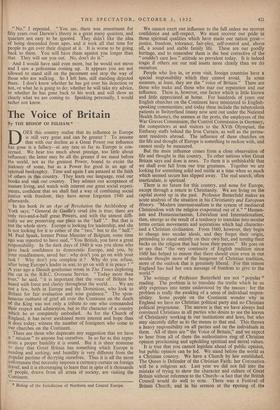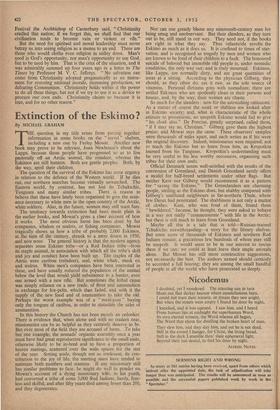The Voice of Britain
By THE BISHOP OF FULHAM *
DOES this country realise that its influence in Europe is still very great and can be greater ? To assume that with our decline as a Great Power our influence has gone is a fallacy—at any rate so far as Europe is con- cerned. We hear too much about prestige, too little about influence; the latter may be all the greater if we stand before the world, not as the greatest Power, bound to excite the jealousy of some, but as a Power for good in an age of spiritual bankruptcy. Time and again I am amazed at the faith of others in this country. They learn our language, read our books and visit our country. They admire our acceptance of austere living, and watch with interest our great social experi- ments, confident that we shall find a way of combining social justice with freedom;, they have never forgotten 1940 and afterwards.
In his book In an Age of Revolution the Archbishop of York says, " General de Gaulle's cruel jibe is true; there are only two-and-a-half great Powers, and with the utmost diffi- culty we are preserving our place as the ` half '." But that is not the whole story. Europe is looking for leadership, and she is not looking for it to either of the " two," but to the " half." M. Paul Spaak, former Prime Minister of Belgium, some time ago was reported to have said," You British, you have a great responsibility. In the dark days of 1940 it was you alone who gave back confidence to democratic Europe, and you, by your steadfastness, saved her : why don't you go on with your task ? Why don't you complete it ? Why do you refuse, after being Europe's leader in war, to go on with it in peace ? " A year ago a Danish gentleman wrote in The Times deploring the cut in the B.B.C. Overseas Service. " Today more than ever," he said, " it is important that the voice of Britain be heard with force and clarity throughout the world. . . . We are not a few, both in Europe and the Dominions, who look to Britain for fair evaluation and wise guidance." The spon- taneous outburst of grief all over the Continent on the death of the King was not only a tribute to one who commanded their respect and admiration; but to the character of a country which he so completely embodied. As for the Church of England, it has never awakened more interest and hope than it does today; witness the number of foreigners who come to our churches on the Continent.
There are those who deprecate any suggestion that we have a " mission " to anyone but ourselves. In so far as this repre- sents a proper humility it is sound. But it is sheer nonsense to deny that Great Britain has something which Europe is needing and seeking; and humility is very different from the popular pastime of decrying ourselves. Thus it is all the more unfortunate that necessity imposes a currency-curtain on foreign travel, and it is encouraging to learn that in spite of it thousands of people, drawn from all strata of society, are visiting the Continent.
* Bishop of the J urisdiction of Northern and Central Europe. We cannot exert our influence to the full unless we recover confidence and self-respect. We must recover our pride in those spiritual qualities which have made our nation great— justice, freedom, tolerance, fair-play, self-control and, above all, a sound and stable family life. These are our goodly heritage, and to remember them is the best corrective of the " couldn't care less " attitude so prevalent today. It is indeed tragic if others see our real assets more clearly than we do ourselves.
People who live in, or even visit, foreign countries have a special responsibility which they cannot avoid. In some measure, at least, they are the " voice of Britain." There are those who make and those who mar our reputation and our influence. There is, however, one factor which is little known and little appreciated at home. For hundreds of years our English churches on the Continent have ministered to English- speaking communities; and today these include the tuberculosis patients in Switzerland (many now sent out under the National Health Scheme), the seamen at the ports, the employees of the War Graves Commission, the Control Commission in Germany, the competitors at and visitors to the XVth Olympiad, the Embassy staffs behind the Iron Curtain, as well as the perma- nent residents abroad. The influence of these churches on the life and thought of Europe is something to reckon with, and cannot easily be measured.
But the main influence comes from a close observation of life and thought in this country. To other nations what Great Britain says and does is news. To them it is unthinkable that we shall ever fall from our true greatness. Together we are looking for something solid and stable at a time when so much which seemed secure has slipped away. The real search, often inarticulate, is spiritual.
There is no future for this country, and none for Europe, except through a return to Christianity. We are living on the capital stored up in the past. Professor Butterfield makes an acute analysis of the situation in his Christianity and European History. "Modern internationalism is the system of mediaeval Christendom with the religion evaporated out of it." " Human- ism and Humanitarianism, Liberalism and Internationalism, then, emerge as the result of a tendency to translate into secular terms certain movements and aspirations which had character- ised a Christian civilisation. From 1660, however, they begin to change into secular ideals, and they forget their origin, pretending to stand entirely on their own feet, and turning their backs on the religion that had been their parent." He goes on to say that " the very continuity of English tradition since 1660 has helped to ensure that there should exist even in our secular thought more of the hangover of Christian tradition, more of the outlook that is genuinely liberal. For this reason England has had her own message of freedom to give to the world."
The writings of Professor Butterfield are not " popular' reading. The problem is to translate the truths which he so ably expresses into terms understood by the masses : for the problem is really the awaking of a sense of individual respon- sibility. Some people on the Continent wonder why in England we have no Christian political party and no Christian political programme. The answer is that we have always had convinced Christians in all parties who desire to see the leaven of Christianity working in our institutions and laws, but who may sincerely differ as to the means to that end. This throws a heavy responsibility on all parties and on the individuals in, them. All of them are " the Voice of Britain," and we expect to hear from all of them the authoritative ring of Christian opinion proclaiming and upholding spiritual and moral values. It is true that you cannot legislate ahead of public opinion, but public opinion can be led. We stand before the world as a Christian country. We have a Church by law established. The Queen is Defender of the Christian Faith; her Coronation will be a religious act. Last year we did not fall into the mistake of trying to show the character and culture of Great Britain without reference to the Church—a fact that the British Council would do well to note. There was a Festival of Britain Church; and in his sermon at the wening of the Festival the Archbishop of Canterbury said, " Christianity cradled this nation; if we forget this, we shall find that our civilisation tends to become vain or violent or vile."
But the need for spiritual and moral leadership must never betray us into seeing religion as a means to an end. There are those who would clothe even religion in utility dress. Man's need is God's opportunity, not man's opportunity to use God, 6ut to be used by him. That is the crux of the situation, and it was admirably summed up four years ago in a letter to The Times by Professor M. V. C. Jeffreys. " No salvation can come from Christianity adopted pragmatically as an instru- ment for restoring national morale, increasing production, or defeating Communism. Christianity holds within it the power to do all these things, but not if we try to use it as a device to procure our own ends. Christianity claims us because it is true, and for no other reason."



















































 Previous page
Previous page